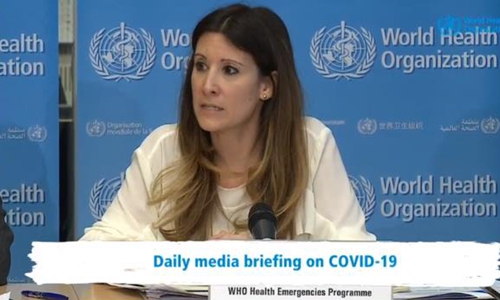HOME >> CHINA
Countries should not wait for ‘pandemic announcement’ to act: analysts
By Zhang Han and Li Qingqing Source:Global Times Published: 2020/3/10 21:43:40

Photo: Screenshot of WHO press conference
The World Health Organization (WHO) has announced that the threat of the COVID-19 pandemic has become "very real" as infections exceed 110,000 in more than 100 countries and regions, with Chinese experts and WHO officials warning that countries should not wait for an announcement of a pandemic to take action amid narrowing opportunities to contain it.
WHO spokesperson Tarik Jasarevic told the Global Times on Tuesday there is no possibility to predict the spread of the novel coronavirus as it is a new virus with many unknowns, especially in regards to severity and transmission, and the virus represents an evolving public health emergency and we expect more cases to be reported in other countries.
With the spike of infections globally, more countries have strengthened measures to curb the spread of the virus, with Italy announcing a nationwide lockdown and Spain suspending schools on Tuesday.
Public health experts noted that the definition of a pandemic is an infectious disease that threatens a large majority of regions and puts most people at risk, as the WHO defined it as "an outbreak of a new pathogen that spreads easily from person to person across the globe."
At the moment, infection and epidemic risks still vary largely among different countries, Zhou Zijun, a professor at Peking University told the Global Times.
The WHO warning was made on Monday's press briefing where the organization's director general Tedros Adhanom underlined that "of all the cases reported globally so far, 93% are from four countries."
Different countries are in different scenarios, requiring a tailored response for each, he said.
But Zhou warned a pandemic is closely around the corner and more countries should take action before community transmission occurs.
Jasarevic said that the epidemic can be pushed back, but only with a collective, coordinated and comprehensive approach that engages the entirety of governance. "We are calling on every country to act with speed, scale and clear-minded determination," he said.
The last time the WHO announced a pandemic was in 2009 when a novel influenza A(H1N1)pdm09 virus, which originated in the US and infected 0.7 to 1.4 billion people globally, one in six of the world's population. The death toll was an inaccurate 151,700-575,400 worldwide, according to US Centers for Disease Prevention and Control. The virus now has transformed into a seasonal flu.
According to the WHO, pandemics will affect a large proportion of the global population and put significant stress on health-care systems. A moderate or severe pandemic will also strain other essential services and cause substantial social and economic impacts.
It is hard to predict what would happen if the current COVID-19 outbreak is announced as a pandemic, Zhou said, stressing that if the disease spreads out of control globally and impacts health and result in economic losses, whether to make such an announcement would not be important any more.
More countries should prepare before it is too late, Zhou said.
The WHO has a guidebook for countries to prepare for flu pandemics, and is providing suggestions on containing the COVID-19. Chen Xi, an assistant professor of public health at Yale University, noted that the world fighting a pandemic may shift attention from containment to reducing harm.
The WHO may not suggest shutting down borders against affected countries as the disease is present everywhere. Health authorities might recommend distancing measures in public, Chen said, noting that the suggestions would only be an advisory without regulative forces.
Countries would still take action based on their evaluation of the situation and medical and social resources that can be mobilized, Zhou said.
Jasarevic said that travel bans "may have a public health rationale at the beginning of the containment phase of an outbreak." But he noted such restrictions need to be short in duration, proportionate to public health risks, and be reconsidered regularly as the situation evolves.
Posted in: SOCIETY